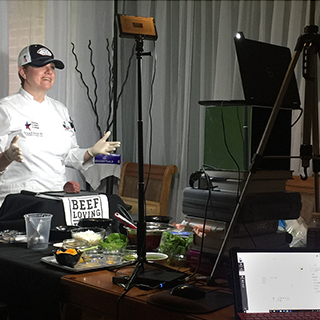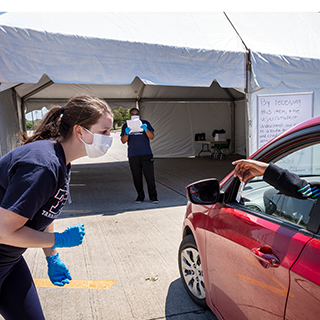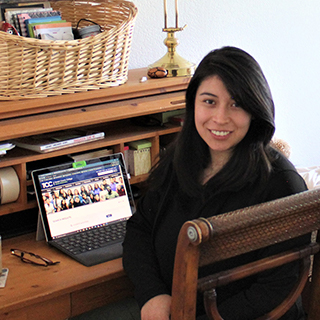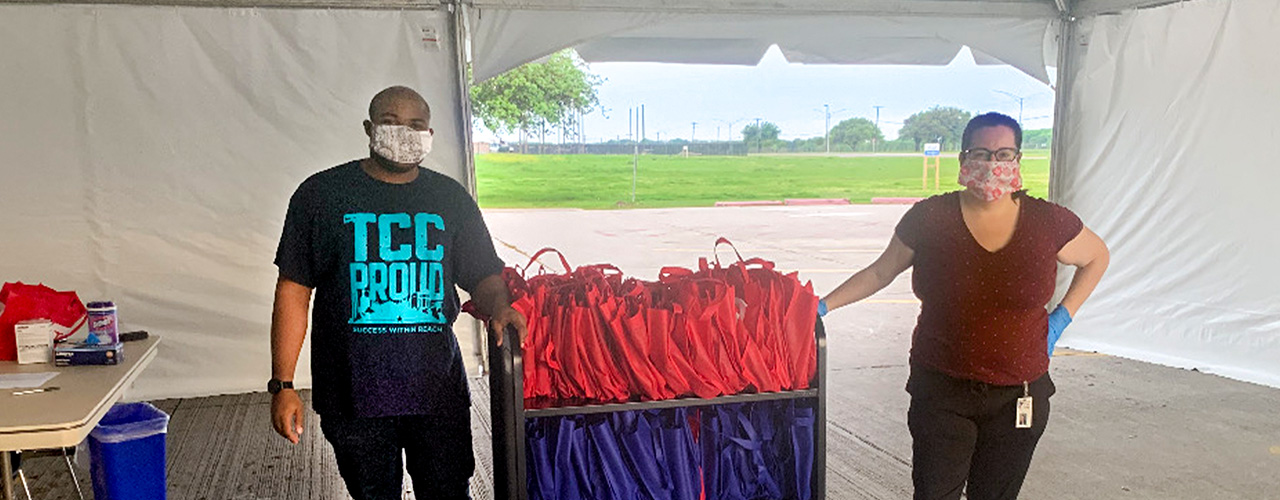It Takes A Village to Turn Virtual
Collaboration is Essential to Keeping Success Within Reach with Remote Delivery of Courses
Tarrant County College (TCC) recognizes that the Spring and Summer 2020 terms did not take place in the way many envisioned. While the Fall 2020 and Spring 2021 semesters are and will be much the same, the College expects students to be engaged, albeit, virtually. Friends, classmates and colleagues have not seen one another except through a computer screen; the once bustling campuses lay still and teaching and learning have found a new form as a result of the COVID-19 pandemic.
 While the Spring 2020 semester had its challenges, TCC was able to work collaboratively
to ensure that teaching and learning shifted seamlessly to remote delivery. TCC faculty
pivoted on a dime from face-to-face instruction to remote delivery of most courses.
A key piece of this virtual learning shift involved faculty members honing their skills.
Outside of teaching for Connect Campus, many faculty members were not familiar with
teaching their courses predominantly online. Faculty spend years perfecting the design
of their courses face-to-face, but suddenly found themselves needing to rethink their
teaching strategies and adapt to a new teaching and learning modality.
While the Spring 2020 semester had its challenges, TCC was able to work collaboratively
to ensure that teaching and learning shifted seamlessly to remote delivery. TCC faculty
pivoted on a dime from face-to-face instruction to remote delivery of most courses.
A key piece of this virtual learning shift involved faculty members honing their skills.
Outside of teaching for Connect Campus, many faculty members were not familiar with
teaching their courses predominantly online. Faculty spend years perfecting the design
of their courses face-to-face, but suddenly found themselves needing to rethink their
teaching strategies and adapt to a new teaching and learning modality.
The Center for Teaching and Learning, TCC Connect and Information Technology supported—through the strategic lens of the College’s Integrated Instructional Learning Environments (IILE) Advisory Panel—and TCC’s faculty worked to bridge knowledge gaps around remote teaching strategies through the curation of a robust faculty resource area. This resource area helped faculty to empower themselves and their students to be successful in this unprecedented time. Faculty learned very quickly the advantages of utilizing the power of both asynchronous (online interactivity provided in a flexible timeframe to account for the schedule of the learner) and synchronous (real-time, face-to-face interaction online) teaching. Faculty went above and beyond to ensure the quality of teaching would not wane amidst this pandemic.
Many faculty members adapted easily to these remote teaching strategies. They jumped at the opportunity to utilize interactivity with technology, which took the form of virtual polls and discussion boards, to name a few. Faculty maintained many traditional active and engaged classroom strategies such as scaffolding, writing to learn and problem-based learning. TCC faculty also worked exceptionally well at setting classroom norms and expectations from the beginning to ensure participation, engagement and success were not compromised and open communication was maintained to support uncertain students through the remainder of the semester.
In anticipation of the coming academic continuity concerns, training for Blackboard, TCC’s online Learning Management System (LMS), was provided College-wide for faculty who needed to learn more about the LMS and its features in the week after Spring Break. Simultaneously, employees learned more about how to virtually meet and collaborate with colleagues via Microsoft Teams, which was named the College’s official remote working collaboration tool for all employees on March 19, 2020. Faculty continued to grow their own knowledge base of educational technology to encourage student success beyond the physical classroom.
Additionally, TCC Connect faculty and instructional designers provided expertise and guidance in assisting faculty to move curriculum and course materials into an online environment under the guidance and direction of the IILE Advisory Panel. With a campus dedicated to online leaning, TCC was able to provide support and tailored subject matter knowledge to assist more “traditional” faculty during the shift to online learning. TCC Connect faculty collaborated with their faculty peers to develop innovative ways to utilize online tools to maintain the same level of collaboration, rigor and interaction that students experience in a face-to-face classroom.
 Focusing on student support also was vital as the College moved to a remote environment.
Students were met with the challenge that while previously, they were in face-to-face
classes with easily access to resources, they were now isolated from academic support,
valuable resources and other lifelines housed on the campuses. TCC’s Learning Commons
principle, along with Academic Support Labs and Academic Affairs, made it possible
to adapt TCC resources, providing these support labs, tutoring, supplemental instruction
and library services remotely to fill this gap. In order to bridge the digital divide,
TCC secured and loaned approximately 1,000 LTE tablets to students to finish the Spring
semester strong.
Focusing on student support also was vital as the College moved to a remote environment.
Students were met with the challenge that while previously, they were in face-to-face
classes with easily access to resources, they were now isolated from academic support,
valuable resources and other lifelines housed on the campuses. TCC’s Learning Commons
principle, along with Academic Support Labs and Academic Affairs, made it possible
to adapt TCC resources, providing these support labs, tutoring, supplemental instruction
and library services remotely to fill this gap. In order to bridge the digital divide,
TCC secured and loaned approximately 1,000 LTE tablets to students to finish the Spring
semester strong.
Throughout the Summer 2020 term, TCC continued to refine its processes to be even better prepared to support students as it prepared for remote instruction in the Fall and now, Spring 2021. Though the campuses appeared quiet, work continued on many fronts. Academic Advising and support continued online, and triage support was made available in person at each campus that reopened at reduced capacity on July 7, 2020. Teaching Touchstone videos, “Shine a Light,” produced by faculty for faculty and endorsed, by the IILE principle, highlighted those faculty going above and beyond to support their students, as well as provide tips on remote teaching strategies for their colleagues.
 Microsoft Teams training continued to promote communication between employees working
from home and faculty and students learning remotely. Even the College for Kids summer
program moved forward using a new approach to reach future TCC students using Google
Classroom and online videos designed to keep students engaged. The Senior Education
program also has adapted its strategies for teaching in Fall 2020 and beyond. Courses
are being offered in a remote capacity, with senior instructors working diligently
to refine their technological skills to provide their courses in this new modality.
Microsoft Teams training continued to promote communication between employees working
from home and faculty and students learning remotely. Even the College for Kids summer
program moved forward using a new approach to reach future TCC students using Google
Classroom and online videos designed to keep students engaged. The Senior Education
program also has adapted its strategies for teaching in Fall 2020 and beyond. Courses
are being offered in a remote capacity, with senior instructors working diligently
to refine their technological skills to provide their courses in this new modality.
Spring 2020 challenged TCC to dig deep and work together to meet the College’s three goals of One College that is Student Ready and able to Serve the Community. While the pandemic required entirely new thinking and the rapid deployment of new strategies and resources in record time, these efforts helped TCC and the community engage in a different way and illustrated that no matter what, TCC always puts “Success Within Reach” for its constituents.

